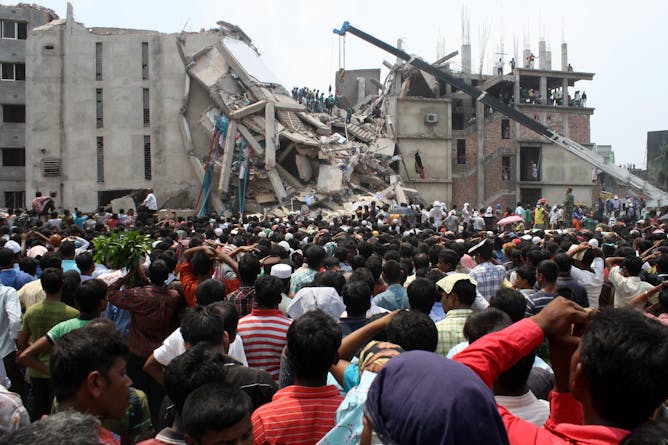|
When the Rana Plaza factory building in Bangladesh collapsed 10 years ago this month, unions called it a “mass industrial homicide.” The accident killed at least 1,132 people and injured more than 2,500.
The building housed multiple garment factories that supplied Western brands including Primark and Walmart, exposing customers to the terrible conditions under which fast fashion has thrived. And while initiatives since then have attempted to address the problems that lead to this terrible tragedy, conditions for many garment workers have not improved.
Muhammad Azizul Islam, a University of Aberdeen expert in sustainability accounting and transparency, explains where these initiatives have gone wrong, as well as the impacts of COVID-19 and inflation on the industry. He calls for a watchdog to investigate and punish companies that aren’t doing right by their workers.
This podcast from The Conversation U.S. also discusses how little has changed for workers in the industry – a decade later, garment workers remain “at the bottom of the global production chain.”
And academics from New Zealand and the U.S. have also written for The Conversation this week about how a global addiction to fast fashion continues to cause corners to be cut in the industry.
|

Muhammad Azizul Islam, University of Aberdeen
At least 1,132 workers died when the Rana building collapsed in Bangladesh, while several thousand more were injured.
|
Quote of the week 💬
|
-
“Gordon Gecko from Oliver Stone’s 'Wall Street' may believe that everything boils down to money and greed, but my research indicates that’s not often the case. While there was a small element of ego, hubris and greed among these inmates, other factors were at play. For example, fear of failure, compensating for perceived deficiencies and feeling overwhelmed by the expectations of others."
– Will Harvey, Professor of Leadership and Education Director at the University of Bristol Business School, University of Bristol, from his story How to repair a damaged reputation
|
|
Philanthropy and Nonprofits
|
-
Marie T. Reilly, Penn State
This is a green light for creating the largest-ever compensation fund for sex abuse claims.
|
|
Transportation
|
-
Don Maier, University of Tennessee
Shipping companies have billions invested in fleets that were built to last decades. Now, the US is calling for zero emissions by 2050, and the EU is raising the cost of fossil fuel use.
|
|
Agriculture
|
-
Bancy M. Mati, Jomo Kenyatta University of Agriculture and Technology
Kenya’s irrigation development is more advanced than official records show because they exclude what some farmers are doing.
|
|
Consumers
|
-
Matthew Pittman, University of Tennessee
Scrolling TikTok or Instagram causes mental fatigue, which can lead people to purchase items based on how many ‘likes’ an ad has instead of how much value the product will bring them.
|
|
Personal finance
|
-
Eun Young (EY) Oh, University of Portsmouth
AI tools could help you to learn more about investing in shares and other financial markets – but it’s not a perfect solution.
|
|